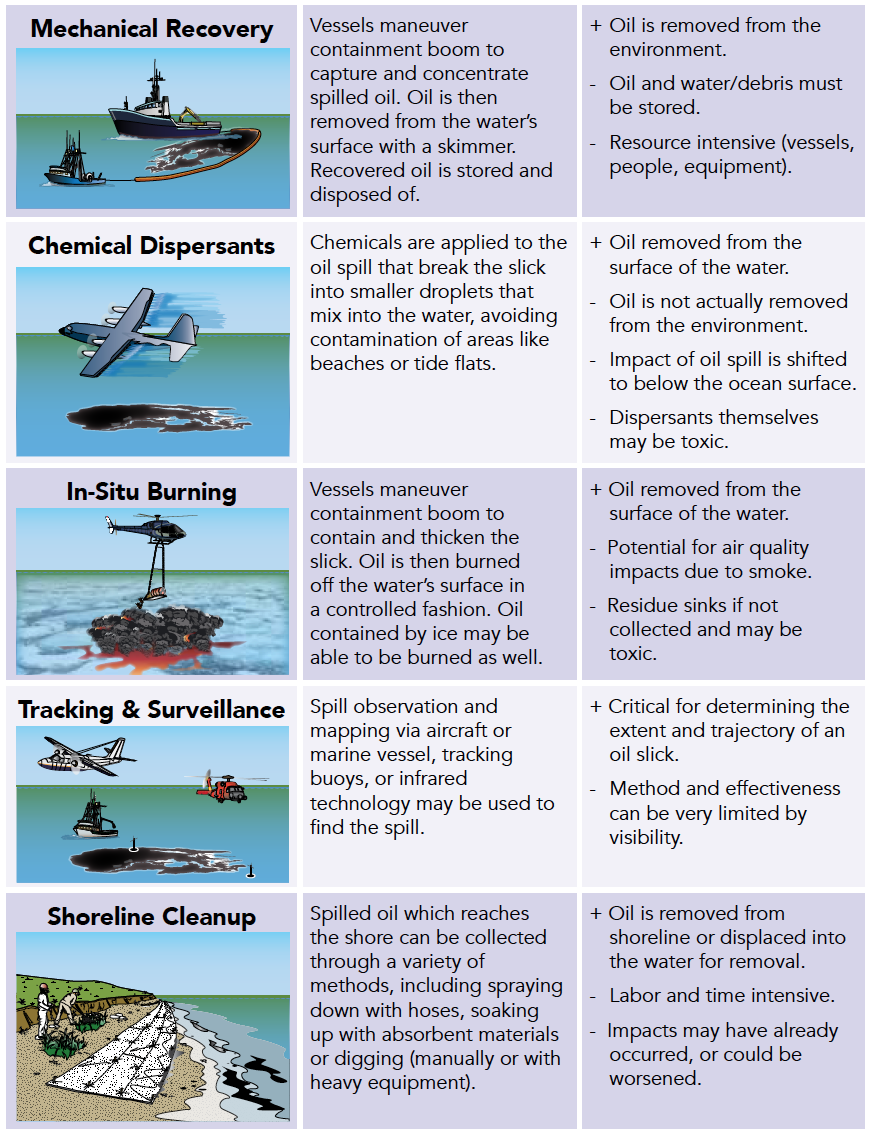Important Facts For Prelims
Oil Spills
- 27 May 2025
- 7 min read
Why in News?
A Liberian-flagged cargo vessel carrying hazardous materials, including calcium carbide and diesel, sank off the Kerala coast, raising serious concerns over oil spills.
- Calcium carbide (CaC2) is a chemical that reacts with seawater to release acetylene gas, which is highly flammable and hazardous.
What are Oil Spills?
- About: Oil Spills refer to the release of liquid petroleum hydrocarbons into the environment, particularly into oceans, rivers, or coastal waters as a result of human activities.
- Impact: Diesel, petroleum, crude oil, and other hydrocarbons may be released from sources such as tankers, offshore platforms, drilling rigs, or wells which have harmful effects on marine ecosystems, coastal livelihoods, and human health.
- Marine Ecosystem: Oil coats the feathers of seabirds and fur of marine mammals, leading to hypothermia and death. It clogs fish gills, impairs reproduction, and becomes toxic when ingested by marine life..
- Oil films block sunlight, affecting phytoplankton and reducing oxygen levels. Coral reefs, mangroves, estuaries (e.g., Sunderbans) get smothered, disrupting ecosystems.
- Coastal Livelihood: Oil spills disrupt fishing, aquaculture, and coastal industries, causing economic hardship for local communities.
- Contaminated beaches and dead marine life reduce tourism, affecting livelihoods and regional economies.
- Cleanup and restoration efforts lead to significant financial burdens on governments and industries.
- Human Health: Health and livelihood risks for indigenous communities due to seafood contamination and reduced fish catches.
- Marine Ecosystem: Oil coats the feathers of seabirds and fur of marine mammals, leading to hypothermia and death. It clogs fish gills, impairs reproduction, and becomes toxic when ingested by marine life..
What are the Measures to Clean Oil Spills?
|
Method |
Description |
|
Bioremediation |
Uses oil-degrading bacteria (e.g., Cycloclasticus, Oleispira) to break down hydrocarbons; eco-friendly and accelerates natural detoxification. |
|
Containment Booms |
Floating barriers that restrict oil spread, aiding in containment, recovery, and minimizing environmental impact. |
|
Skimmers |
Mechanical devices that collect oil from the water surface for safe disposal or recycling; effective when deployed quickly. |
|
Sorbents |
They absorb or adsorb oil from water and are particularly useful for small spills or residual oil after primary cleanup. Natural sorbents (Straw, Volcanic ash), Synthetic (Polyester-derived plastic shavings). |
|
Dispersing Agents |
Surfactant-based chemicals that break oil into droplets for faster biodegradation. It is effective but may harm marine life due to its potential toxicity. |
What are the Legal and Institutional Frameworks on Oil Pollution Control?
- Indian Legal Framework:
- Merchant Shipping Act, 1958: Serves as the primary maritime legislation. Incorporates provisions of the International Convention for the Prevention of Pollution from Ships (MARPOL) Convention to regulate ship-borne pollution, including oil discharges.
- National Oil Spill Disaster Contingency Plan (NOS-DCP), 1993: Implemented by the Indian Coast Guard, as a key framework for coordinated oil spill response.
- Though not legally binding, it ensures timely and integrated action among stakeholders.
- National Green Tribunal (NGT) Act, 2010: NGT provides a judicial mechanism for swift adjudication of environmental disputes, including marine pollution, and awards compensation for damages.
- International Frameworks:
- Bunker Oil Convention (2001): Ratified by India in 2015 under the IMO, this convention ensures prompt and adequate compensation for damage caused by fuel oil spills from ships’ bunkers, protecting those affected by such pollution incidents.
- MARPOL 73/78 (Annex I): India is a party to this key international convention aimed at preventing marine pollution from ships, covering both operational discharges and accidental oil spills.
- Civil Liability Convention (CLC), 1969 & International Oil Pollution Compensation Fund (IOPC), 1992: Establish liability and compensation mechanisms for oil spill damage. Facilitate financial recovery and legal recourse for victims and governments in the event of tanker spills.
UPSC Civil Services Examination Previous Year Question (PYQ)
Prelims
Q. With reference to the United Nations Convention on the Law of Sea, consider the following statements:
- A coastal state has the right to establish the breadth of its territorial sea up to a limit not exceeding 12 nautical miles, measured from baseline determined in accordance with the convention.
- Ships of all states, whether coastal or land-locked, enjoy the right of innocent passage through the territorial sea.
- The Exclusive Economic Zone shall not extend beyond 200 nautical miles from the baseline from which the breadth of the territorial sea is measured.
Which of the statements given above are correct?
(a) 1 and 2 only
(b) 2 and 3 only
(c) 1 and 3 only
(d) 1, 2 and 3
Ans: (d)
Q. Which of the following can be threats to the biodiversity of a geographical area? (2012)
- Global warming
- Fragmentation of habitat
- Invasion of alien species
- Promotion of vegetarianism
Select the correct answer using the codes given below:
(a) 1, 2 and 3 only
(b) 2 and 3 only
(c) 1 and 4 only
(d) 1, 2, 3 and 4
Ans: (a)
Q. Biodiversity forms the basis for human existence in the following ways: (2011)
- Soil formation
- Prevention of soil erosion
- Recycling of waste
- Pollination of crops
Select the correct answer using the codes given below:
(a) 1, 2 and 3 only
(b) 2, 3 and 4 only
(c) 1 and 4 only
(d) 1, 2, 3 and 4
Ans: (d)







